Le Monde des Choristes is a DVD released in 2004 which features three films of Philippe Reypens: L’Or des Anges, Un peu de Fièvre and Rejoice
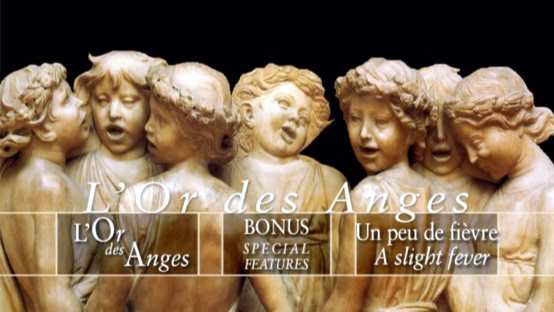
L’Or des Anges focuses on treble music
 L’Or des Anges is a fictional documentary which focuses on treble music, since its creation in medieval times until nowadays. It’s a documentary because the film is based on a lot of careful research that gives the viewer an idea of the development of musical culture across Europe. But it’s also fictional because the directors had to use young actors to recreate the events which were depicted in the film. I have always been fond of treble music, but I admit that many of the facts revealed by this film were unknown to me. Facts such as in the very early days, the choirs were supposed to sing without musical accompaniment as the church considered all instruments to be pagan tools, even if the harp in the Old Testament is considered to be the acting soul.
L’Or des Anges is a fictional documentary which focuses on treble music, since its creation in medieval times until nowadays. It’s a documentary because the film is based on a lot of careful research that gives the viewer an idea of the development of musical culture across Europe. But it’s also fictional because the directors had to use young actors to recreate the events which were depicted in the film. I have always been fond of treble music, but I admit that many of the facts revealed by this film were unknown to me. Facts such as in the very early days, the choirs were supposed to sing without musical accompaniment as the church considered all instruments to be pagan tools, even if the harp in the Old Testament is considered to be the acting soul.
In those early days, should a boy want to praise God through singing he was required to present a legitimate birth certificate, be auditioned by the music master and then, if his voice promised enchantment, he was required to obtain permission from his parents to become a choir boy and then serve the church for as long as it shall please her. Next, the film focuses on the impact of choral music on the Industrial Revolution. During this period,the new capitalistic dogma of productivity, the new family code of ethics and the demographic obsession affected the development of the choral music. Most valuable for industry were the singers of light opera,which was at the time in quite heavy demand. Often poorly paid children were recruited for the performances. Among the many beautiful performances on the DVD, there is an opera scene from which it is obvious that often boys were recruited for both the male and female roles in this art form.
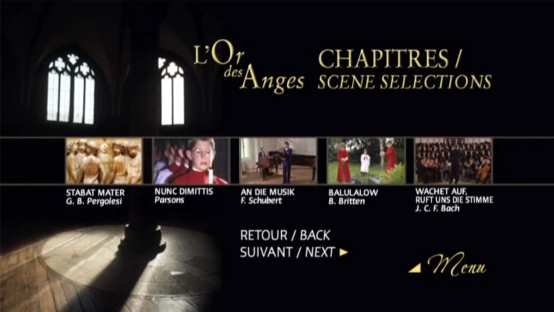
My opinion is that the L’Or des Anges is invaluable for any young singer regardless of the genre in which he chooses to perform, as it covers the basics of vocal training and musical history which would prove beneficial for anyone with a serious interest in music – treble or not.
Even though I have no doubts that many of you would enjoy the choir and solo performance in L’Or des Anges, I highly recommend that after seeing the film you go out and try to attend a choir concert in your locality. The magic of the voices can be fully felt only in such a live performance. I have been fortunate to attend more than 20 concerts of the choirs in the city in which I was living few years ago. During those concerts, I got to know some of the choristers and the choirmasters and they never ceased to surpass my expectations at every single concert I attended. Most recently, I attended a concert of the Vienna Boys Choir in Madrid and the feeling of being there and listening to their repertoire is indescribable with words….
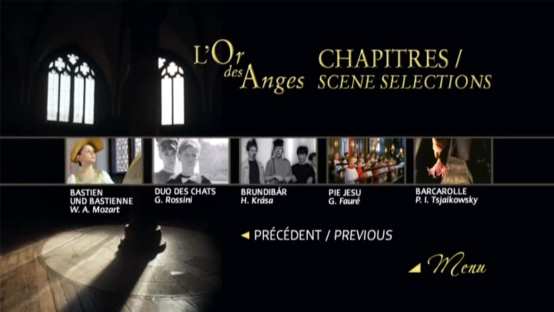
To stay informed about the recent happenings around the world and to read more about the choirs and events in your country, I recommend the The Boy Choir & Soloist Directory, which is an amazing resource that features information about choirs, boy sopranos, young singers, and international choral events.
Un peu de Fièvre
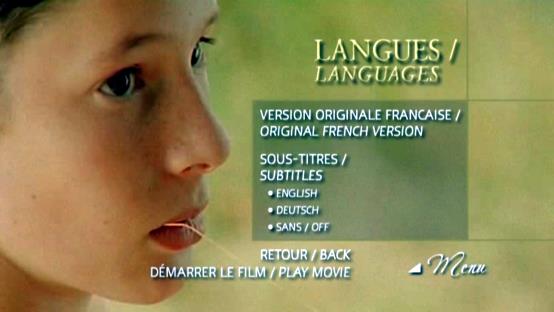
Un peu de ievre ( A Slight Fever)is a short film included as an extra in the Le Monde des Choristes DVD
It’s a short film that is going to be a beloved film for anyone who has an interest in music. It tells the story of a boy who is worried that his voice is changing and that he won’t be able to perform the parts in the choir that he loves to sing. The film is beautifully shot with a lot of long exposures and close-up scenes, but most importantly the piano music and the treble performances in it are breathtaking. I was overwhelmed with memories while watching the story because there is a soloist in one of my favorite choirs who is bound to go through similar experiences as he grows older and his voice changes. Unavoidably, I started thinking of his performances and of myself attending the concerts of the choir expecting to hear his solo. It’s two years since I moved from that town, but a friend of mine who keeps attending the concerts recently let me know that the boy is still the main soloist of the choir. One day, when his voice changes, I hope he will be able to accept it and deal with that even if I suppose that it won’t be as easy for him as I would like it to be. (he attends a musical school in the city where he lives, majoring in piano, and I hope that he, as did the character of the film, will find comfort in perfecting his instrumental skills as an alternative to his singing).
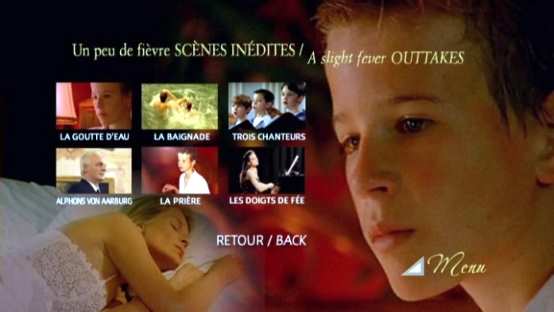
One of the blog’s guest authors, Bestpi, wrote a very intriguing article on voice change entitled “My voice broke! I can’t sing anymore. Will it ever come back? ” I encourage all young singers and their parents to read it and share their experiences with the readers of the blog. In the final words of the film’s director in the bonus feature of the DVD – Making of A Slight Fever – were that he hoped that his film would touch both the hearts and the minds of its viewers. It, indeed, did that for me…
Rejoice
Rejoice is a documentary of the 7th international Boys’ Choir Festival in Poznan.
Rejoice is the third film featured on the Le Monde des Choristes DVD. It’s an insightful documentary about the 7th International Boys’ Choir Festival in Poznan. Seeing the documentary made me desire to attend some of the future festivals, especially after finding out that Poland is one of the few countries, along with Great Britain, that has managed to maintain the treble choral tradition since the Middle Ages. Quoting the film director: ” Rejoice is, as its name implies, the “joy” of a voice that reaches its fullness; A slight fever is the moment, the flower fades. “
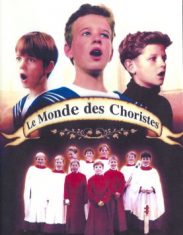 Some of the choirs featured on the DVD : the Knabenchor Hannover, Les Petits Chanteurs à la Croix de Bois, Polskie Slowiki, the Wiener Sängerknaben, and the Worcester Cathedral Choir.Music in the flim includes “Nunc Dimittis” (Parsons), “An die Musik” (Schubert), “Balualow” (A Ceremony of Carols by Britten), “Wachet auf, ruft uns die Stimme” (Bach), “Bastien und Bastienne” (Mozart), “Le Duo des chats” (Rossini), “Brundibar” (Krasa), and “Pie Jesu” (Requiem by Faure). There are also excerpts from music by Pergolesi, Bach, Allegri, and Tchaikovski.
Some of the choirs featured on the DVD : the Knabenchor Hannover, Les Petits Chanteurs à la Croix de Bois, Polskie Slowiki, the Wiener Sängerknaben, and the Worcester Cathedral Choir.Music in the flim includes “Nunc Dimittis” (Parsons), “An die Musik” (Schubert), “Balualow” (A Ceremony of Carols by Britten), “Wachet auf, ruft uns die Stimme” (Bach), “Bastien und Bastienne” (Mozart), “Le Duo des chats” (Rossini), “Brundibar” (Krasa), and “Pie Jesu” (Requiem by Faure). There are also excerpts from music by Pergolesi, Bach, Allegri, and Tchaikovski.
A Japanese fan site featuring a photo-gallery and exclusive clips from the DVD *
——————————————————————————————————————————————-
This review would not have been possible without the valuable support of CVMC.net, which provided the DVD of Le Monde des Choristes for review at theskykid.com. I would like to express my thankfulness for their continuous support of the blog.
_______________________________________________________________